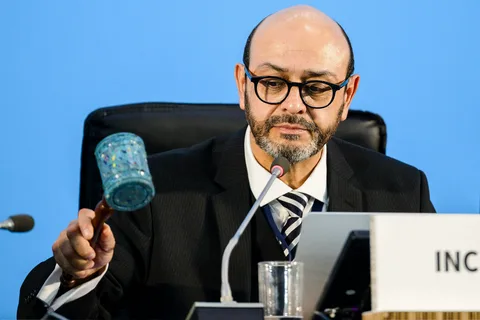The fifth session of the United Nations Intergovernmental Negotiating Committee (INC-5) in Busan, South Korea, concluded without an agreement on a global treaty to combat plastic pollution. The session, which was expected to produce a legally binding treaty, highlighted sharp divisions between nations advocating for a reduction in plastic production and those favoring a focus solely on managing plastic waste.
Major Points of Contention
- Plastic Production Cap
Over 100 countries, led by Panama, pushed for a global reduction target on plastic production, citing the need for robust measures to address the escalating pollution crisis. On the other side, a small bloc of petrochemical-producing nations, including Saudi Arabia, strongly opposed production caps, focusing instead on managing waste and using procedural tactics to delay progress. - Chemicals and Product Management
Discussions around regulating harmful chemicals used in plastics and overseeing plastic product lifecycle management also failed to reach consensus. A UNEP report identifies over 3,200 chemicals of concern in plastics, underscoring the health risks, particularly to women and children. - Financing Mechanisms
Developing nations sought financial commitments to implement treaty obligations, which remain unresolved, further widening the gap between stakeholders. - Procedural Challenges
Negotiations were hampered by the UN’s consensus process, which allowed dissenting nations to stall progress. Some delegations, including Senegal, criticized the absence of voting mechanisms, calling it a “big mistake.”
Postponement and Reactions
The INC-5 talks will resume as INC-5.2 at a later date, but the delay has sparked frustration:
- Panama’s Delegation Head, Juan Carlos Monterrey Gomez: “Every day of delay is a day against humanity. Postponing negotiations does not postpone the crisis.”
- Rwanda’s Juliet Kabera: Urged for a treaty “fit for purpose” and warned against reliance on voluntary measures.
Environmental groups, such as GAIA, expressed skepticism about achieving success in the next round, while the International Council of Chemical Associations emphasized the complexity of the issue and called for inclusive solutions.
Broader Context
Plastic production is projected to triple by 2050, exacerbating pollution that already impacts air, food, and human health. The failure of INC-5 echoes frustrations seen at the recent COP29 summit, where procedural obstacles also hindered progress on climate finance and fossil fuel commitments.
Looking Ahead
The postponement of decisions raises doubts about the treaty’s prospects. However, negotiators emphasized the urgency of resuming talks, as the stakes grow higher with every delay.










